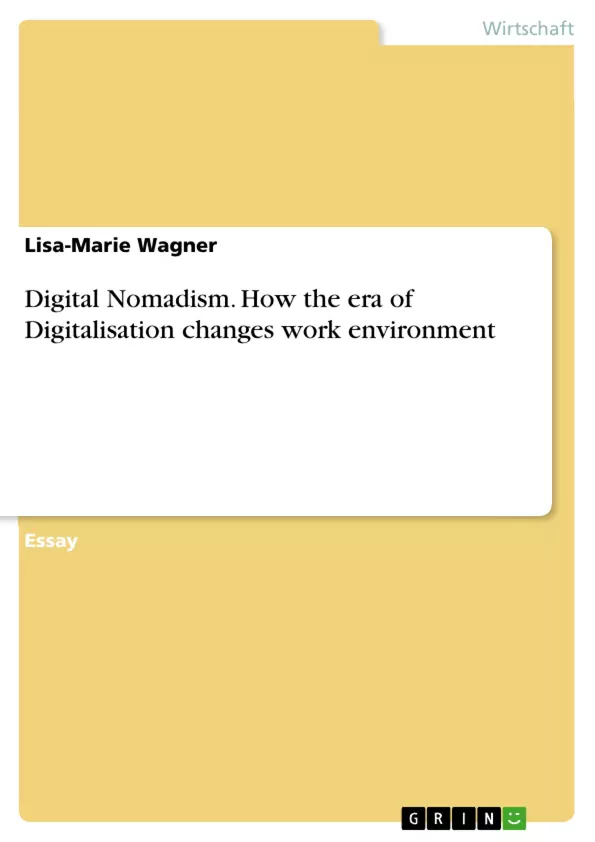This paper deals with the changed situation of traditional workplaces, flexible living and working models such as the digital nomadism and shows how digitization is fundamentally changing the world of work, especially the flexibility of the workplace. It will explain what will be demanded of traditional employees and digital nomads in the future, which opportunities and risks will arise, and which adjustments traditional companies will have to make.
For example, the demands on employees, especially their soft skills, will change fundamentally in the coming years. Intercultural competencies and analytical skills will gain in importance. Also digital nomads have to face challenges, which are similar to traditional self-employed and freelancers. Companies must continue to monitor future change and prepare their employees for future requirements. Recruitment processes in human resources departments will also change in the future, because recruiting based on specialist knowledge alone will no longer be sufficient.
The work is divided into a theoretical part and a practical part. In the theoretical part, the terms that provide the fundamental basis of the work are explained and delimited and the concept and development of Digital Nomadism is presented. In a further step, the possibilities for the practice of location-independent work are examined. In the practical part, the advantages and disadvantages of Digital Nomadism, opportunities and challenges are presented and, building on these, possible recommendations for action and possible future strategies for employees, the self-employed and traditional companies are derived. Subsequently, a conclusion will be drawn and an outlook will be given on possible further research fields which could be the subject of other scientific papers. Primarily digital publications of literature and statistics were used for research on this new form of work, which is characterized by rapid change and transformation. In order to build the work on current research results, mainly sources published in the last four years were used.
Inhaltsverzeichnis
- Introduction
- Problem and objective target
- Approach and structure of this paper
- Clarifications and definition of terms
- Teleworking and Home Office
- Coworking
- Origin and concept of Digital Nomadism
- Working methods and professional groups
- Development of Digital Nomadism
- Opportunities and challenges for Digital Nomadism
- New requirements for employees and the self-employed: Digital know-how as a key qualification
- Future strategies for traditional companies
- Conclusion and further research requirements
Zielsetzung und Themenschwerpunkte
Diese Arbeit untersucht die Auswirkungen der Digitalisierung auf die Arbeitswelt und beleuchtet dabei insbesondere die neuen Arbeitsmodelle wie den Digitalen Nomadismus. Sie beleuchtet die Herausforderungen und Chancen, die sich für Unternehmen, Arbeitnehmer und Selbstständige ergeben.
- Die Auswirkungen der Digitalisierung auf die Arbeitswelt
- Das Aufkommen neuer Arbeitsmodelle wie Digital Nomadismus
- Die Anforderungen an die Qualifikationen von Mitarbeitern und Selbstständigen
- Die Strategien von traditionellen Unternehmen im Angesicht der Digitalisierung
- Die Chancen und Risiken des Digitalen Nomadismus
Zusammenfassung der Kapitel
- Introduction: Dieses Kapitel erläutert den Wandel der Arbeitswelt durch die Digitalisierung und stellt den Digitalen Nomadismus als ein neues Arbeitsmodell vor. Es verdeutlicht die Bedeutung des Themas und die Notwendigkeit, sich mit den Veränderungen auseinanderzusetzen.
- Clarifications and definition of terms: Dieses Kapitel definiert zentrale Begriffe, die im Zusammenhang mit der Digitalisierung und neuen Arbeitsmodellen relevant sind, wie Telearbeit, Home Office und Coworking.
- Origin and concept of Digital Nomadism: Dieses Kapitel untersucht die Entstehung und die Konzepte des Digitalen Nomadismus, beleuchtet die Arbeitsmethoden und Berufsgruppen, die sich diesem Lifestyle verschreiben, und zeichnet die Entwicklung dieses Trends nach.
- Opportunities and challenges for Digital Nomadism: Dieses Kapitel beleuchtet die Chancen und Herausforderungen, die sich für Digitale Nomaden ergeben. Es analysiert die Vorteile der Flexibilität und der Möglichkeit, ortsunabhängig zu arbeiten, aber auch die potenziellen Risiken und Schwierigkeiten, die diese Arbeitsweise mit sich bringt.
- New requirements for employees and the self-employed: Digital know-how as a key qualification: Dieses Kapitel befasst sich mit den neuen Anforderungen, die an Arbeitnehmer und Selbstständige gestellt werden, um erfolgreich in der digitalisierten Arbeitswelt zu bestehen. Es betont die Bedeutung von digitalen Kompetenzen und Soft Skills.
- Future strategies for traditional companies: Dieses Kapitel befasst sich mit den Strategien, die traditionelle Unternehmen entwickeln müssen, um sich den Veränderungen der Arbeitswelt durch die Digitalisierung anzupassen. Es betrachtet die Anpassung von Arbeitsstrukturen und -kulturen sowie die Rekrutierung von qualifizierten Mitarbeitern.
Schlüsselwörter
Digitale Nomaden, Digitalisierung, Arbeitswelt, Telearbeit, Home Office, Coworking, Flexibilität, ortsunabhängiges Arbeiten, Soft Skills, Qualifikation, Zukunft der Arbeit, Unternehmen, Rekrutierung, Chancen, Risiken.
Häufig gestellte Fragen
Was versteht man unter Digitalem Nomadismus?
Digitaler Nomadismus beschreibt ein Arbeitsmodell, bei dem Menschen dank Digitalisierung ortsunabhängig arbeiten und oft einen mobilen Lebensstil führen.
Welche Qualifikationen sind für die digitale Arbeitswelt wichtig?
Besonders Soft Skills, interkulturelle Kompetenzen, analytische Fähigkeiten und digitales Know-how werden als Schlüsselqualifikationen immer bedeutender.
Wie verändert die Digitalisierung die Rekrutierung in Unternehmen?
Fachwissen allein reicht künftig nicht mehr aus; Personalabteilungen müssen verstärkt auf digitale Kompetenzen und die Anpassungsfähigkeit der Bewerber achten.
Was sind die größten Herausforderungen für digitale Nomaden?
Digitale Nomaden stehen vor ähnlichen Herausforderungen wie Freiberufler, darunter die Selbstorganisation, soziale Absicherung und die Trennung von Arbeit und Privatleben.
Was ist der Unterschied zwischen Telearbeit und Home Office?
Die Arbeit definiert und grenzt diese Begriffe ab, wobei Telearbeit oft festere Strukturen besitzt, während Home Office flexibleres Arbeiten von zu Hause beschreibt.
- Citation du texte
- Lisa-Marie Wagner (Auteur), 2018, Digital Nomadism. How the era of Digitalisation changes work environment, Munich, GRIN Verlag, https://www.grin.com/document/958038



